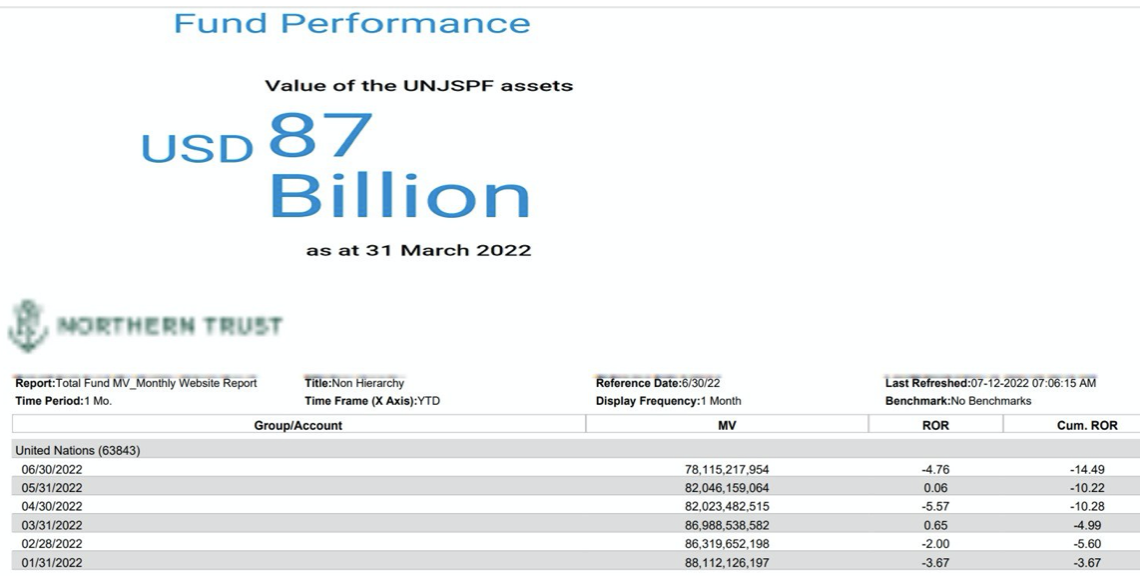Dear Mr. Guazo,
I wrote to you on 16 October 2023 posing several questions about reported underperformance of the UN Pension Fund’s investments; the lack of investment reporting in the 2022 annual report; the low quality of investment reporting on the Fund’s website; the cause(s) of a high increase in the Fund’s funding ratio; and reported OIOS investigations of 15 Fund staff.
http://unpension.blogspot.com/2023/10/open-letter-to-pedro-guazo.html
There has been no response from you. However, there have been developments as follows: your office, OIM (Office of Investment Management) posted detailed investment reports on the Fund’s website; OIM posted a “Positive performance” report on 3 November 2023, that includes links to two comparison reports (2021 and 2022).
Each of these developments raises more questions:
New investment reporting on the Fund’s website
On 18 October 2023, two days after my letter to you, OIM posted 13 pages of investment reports on the Fund’s website.
https://www.unjspf.org/the-fund/historical-fund-performance/
This is information that should have been included in the 56-page annual report for 2022, which contains only two paragraphs on investment performance, on page 25.
Questions:
Why were these investment reports posted on the website on 18 October not included in the 2022 annual report?
Will these detailed reports be a consistent feature on the Fund’s website and in annual reports in future?
Positive Performance newsletter
On 3 November, OIM released a newsletter titled “Positive performance of the Fund’s investment management just reconfirmed that includes a comparative performance with similar funds.”
In the newsletter, OIM paraphrases and links to a 2022 CEM Benchmarking report (quote): “Your 5-year net total return was 4.2%. This was above both the Global median of 3.3% and the peer median of 3.9%.”
Yet, the recent ACABQ report, A/78/7/Add.7, 24 October 2023); paragraph 10, does not quote the 2022 CEM report. Rather, it quotes the CEM 2021 report as follows: “the five-year net total return of the Fund was 11.3 per cent, which was above the global median of 10.4 per cent and equal to the peer median of 11.3 per cent”.
Questions:
Why does the recently published ACABQ report include (more favorable) information from the 2021 CEM comparative report rather than the 2022 report?
Why was information from the 2021 and/or 2022 CEM comparative analysis not included in the 2022 Annual Report?
Further on this topic, the ACABQ notes in paragraph 12 of its report that “information on comparison with peers was included in the report on the investments of the Pension Fund (A/78/329, annex II to annex X).” A/78/329 is actually the symbol of the 2023 Pension Board report, not the report on investments, which is A/C.5/77/2 dated 17 August 2022, in which I am unable to find any mention of a comparison report .
Questions:
Why is there no information on a comparison report in the 2022 investment report?
Will there be information on a comparison report in the 2024 investment report, since these are only published every two years?
Comparison report
Recall that my previous letter to you raised questions about a TUCS (Trust Universe Comparison Service) comparative report showing “the fund is solidly in the bottom 25% compared to its peers and for 2022 came dangerously close to being in the bottom 5%”.
That the CEMS Benchmarking studies you share in the newsletter present a rather more positive picture of the Fund’s performance vis à vis its peers does not, in my view, invalidate the TUCS report. The Fund simply chooses to use a different metric. I continue to be interested in knowing your views on the TUCS report.
Questions:
How does CEMS compare with TUCS? For example, what are the differences in the size of the respective universe of participants, and the specific pension funds and their market values, included in or excluded from, the respective comparisons?
Specifically, were Swiss pension funds included in the CEMS comparison? I understand (but have been unable to verify) that a comparative study of Swiss pension funds in 2022 placed the UNJSPF near the bottom percentile.
Value added
Quote from 2021 CEM report: “Your 5-year net value added was 0.0%. This was below both the Global median of 0.4% and the peer median of 0.6%. (See paragraph 10 (b) of the ACABQ report).
Quote from 2022 CEM report: “Your 5-year net value added was 0.0%. This was below both the Global median of 0.6% and the peer median of 1.0%.
I understand “value added” to mean “an increase in returns due to managerial decisions”.
Question:
To what factors do you attribute the Fund’s low value added by managerial decisions to investment performance?
Investment terminology
The 2022 CEM report states: “Your 5-year net total return was 4.2%. This was above both the Global median of 3.3% and the peer median of 3.9%.”
The OIM “Positive performance” newsletter states: “The 5-year net total nominal return of the portfolio was 4.2%, surpassing both the global median of 3.3% and the peer median of 3.9.”
I understand “nominal” when related to investments to mean before adjusting for taxes and inflation.
Questions:
What does “nominal” mean in the above context?
Why isn’t the Fund’s terminology consistent so that its stakeholders may easily understand meaning?
Funding ratio
Recall my question about the cause(s) of the increase from 86% to 117% in funding ratio from 2011 to 2021 (page 33 of the annual report). Paragraph 8 of the 2022 ACABQ report, A/77/7/Add.10, 28 October 2022, notes that it is reported that the funding ratio “ improved from 107.1 per cent as at 31 December 2019 to 117.0 per cent as at 31 December 2021, “owing to the good performance of the Fund in 2020 and 2021.”
Question:
Besides “good performance” what are the other causes of the curiously high increase in funding ratio over the past 10 years? See list of possibilities in my previous letter.
OIOS investigations of Fund staff
There has been no response to my question about the cause(s) of the OIOS investigation of 15 Fund staff (paragraph 109 of UN report A/78/301) including, reportedly, senior investment officers, and the possible impact on staff morale and performance, in the past, currently, and in future.
Question:
Is retaliation against whistleblowers a factor in these investigations?
What are you doing to ensure that staff members under investigation receive due process?
Investment performance
Some additional thoughts on investment performance.
Given that ‘median’ means midpoint”, i.e., half of participants were below that number, and half were above, the CEM results and the OIM newsletter appear to characterize the Fund’s performance as a contented average-performing fish swimming languidly in an average-sized pond.
What about the possibility of billions of dollars left in the market were the Fund to increase its performance to more than above the median?
Indeed, the General Assembly consistently urges the Fund to improve its investment performance. As a recent example, in paragraph 10 of its 2022 report, A/77/7/Add.10, 28 October 2022, the ACABQ “ notes the investment performance of the Fund for 2021 and encourages the Fund to continue its efforts to improve the performance of its investments” -- and that’s before investment performance decreased for 2022
Fund members’ right to ask questions and receive answers
You are aware that Fund members are in fact the owners of the Fund, and that as a public pension fund, the Fund is subject to transparency and other standards. Members have a right to ask questions. The Secretary-General is the Fund’s fiduciary. You, as his representative, have obligations to the Fund’s stakeholders, to respond to questions, including about the Fund’s performance and sustainability.
Fund members have a right to ask questions and receive answers particularly given the Fund’s history of managerial and governance shortcomings as documented in various audits, and as mentioned in my letter, including investment audit, A/75/215, July 2020, that found deficiencies in investment governance mechanisms, a “toxic” staff/management culture, and stressed the need for a “culture transformation programme to cultivate a harmonious, high-performing and ethical culture in the Office.”
To be fair, that audit was performed before you assumed the position of RSG. Still, I am not aware of any available information about steps taken by you to improve governance and change the culture described in the audit.
There is mention in paragraph 55 of the recent ACABQ report, concerning the OIOS investigations of Fund staff, of a “culture implementation plan” and positive “leadership culture assessment” surveys. Plans and surveys are precursors to steps to bring about organizational change, they are not the actual transformational actions.
Question:
What concrete steps have you taken to effect a positive change in organizational culture, including staff/management relations?
Mosaic Governance report
In 2020, in response to a request by the General Assembly (A/Res/74/263, para 8) for an independent governance review of the Fund, Mosaic Governance Advisors present a 200 page report that found significant variances regarding all the governance issues it reviewed, including how Pension Board members understood their fiduciary responsibility.
Question:
Which of these recommendations, if any, have been implemented since 2020?
Why self-representation
One might ask why, given that there are purported retiree representatives to the Pension Board, I choose to exercise personal advocacy including in bringing my concerns directly to you. My experience over a number of years is that the retiree organization (FAFICS) assigned that task, is a solid part of the problem of non-transparency surrounding the Fund, including the Pension Board’s recent “ethics” guidelines that impose extreme confidentiality requirements on its members with the result of quashing dissenting voices among staff representatives on the Board.
I continue to await a response to the questions in my letter of 16 October and the additional questions I have posed here. Whether or not you choose to respond directly, my interest is primarily in results; and there appear to be some results.
I will, therefore, continue to publicize my questions in the hope of engaging your attention and that of decision-makers for the purpose of obtaining results related to these issues that impact the Fund’s health and sustainability.
Yours sincerely,
Loraine Rickard-Martin, Beneficiary, UNJSPF
Admin, UN Pension Blog
c.c. Catherine Pollard, Under-Secretary-General for Management Strategy, Policy and Compliance
Courtenay Rattray, Chef de Cabinet, Office of the Secretary-General
“UN Pension Blog is rated among the 20 best Pension blogs [2023] from thousands of blogs on the web and ranked by traffic, social media followers & freshness.” https://blog.feedspot.com/pension_blogs/





